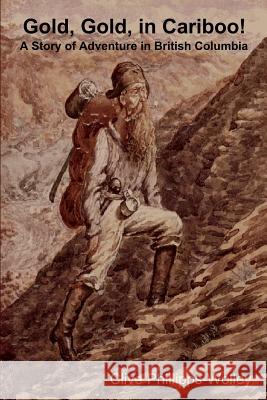Gold, Gold, in Cariboo! » książka
Gold, Gold, in Cariboo!
ISBN-13: 9781500122140 / Angielski / Miękka / 2014 / 180 str.
With Kiplingesque bravado, Sir Clive Phillipps-Wolley was a great white hunter who epitomizes an era of British Columbian literature that portrayed B.C. as a rough Eden that only required English pluck and perseverance to be tamed. Born Edward Clive Oldnall Long Phillips in 1853 in Dorset, England, Phillipps-Wolley was a distant relative of Lord Robert Clive, knighted for his military and administrative roles during the subjugation of Bengal in the 18th century. As Phillips, he successfully petitioned for the inheritance of his great-grandfather's estate, dropped the first name Edward in favour of Clive, changed his last name to Phillipps-Wolley, took up the study of law, married 16-year-old Janie Fenwick, taught musketry and then managed to practise law for less than a year. In 1881, he published Sport in the Crimea and Caucasus, based on his time hunting in Russia. Trottings of a Tenderfoot: A Visit to the Columbian Fiords (1888) is mostly about his two-month hunting trip to B.C., mainly on Vancouver Island. "I came across no place in America in which I would be so content to stay as in Victoria," he wrote. He returned in 1886 on a game hunting expedition, described in A Sportsman's Eden (1888), after which he settled in Victoria in 1890. "You could not pay me to come back to the old country," he said in an interview with the London Mining Journal. Phillipps-Wolley followed his hastily written novel about a remittance man on Vancouver Island, One of the Broken Brigade (1897), with The Chicamon Stone (1900), a novel that includes a heroic Tahltan named Siyah Joe who knows the secret location of gold on McDame Creek. (Chicamon means gold.) Phillipps-Wolley had some commercial success with Gold, Gold in Cariboo (1894), a young adult novel, set in 1862, warning against the folly of gold fever, and proved himself popular as a public speaker, although he repeatedly failed in his attempts to gain election as a politician. As a provincial sanitary inspector, he described Nelson as a disaster area and criticized B.C.'s Chinese as living cheaply in unsanitary conditions to compete in the labour market. "Wherever I have been in British Columbia I have found Chinamen living like sewer rats, a grave danger to white men's health." He concluded, "Nanaimo Chinatown can be cured in only one way-by fire." He equally despised Americans. "Canada's danger is a moral, not a physical one," he decreed. "If you should allow your newspapers to draw their news, as they copy their style, from the Yankees, annexation will soon follow." Warning of an expanding German navy, Phillipps-Wolley began urging Canada to build warships for England in 1908. At his own expense, he published a pamphlet containing his speeches, entitled The Canadian Naval Question. Phillipps-Wolley's son Clive Jr. was killed as a young soldier in 1914, days after England declared war on Germany. Phillipps-Wolley was knighted in 1915. Two years later he dedicated the poems in Songs from a Young Man's Land to his dead son. Phillipps-Wolley died of a cerebral hemorrhage in 1918 and was buried in the St. Peter's Anglican Church cemetery in Duncan. (abcbookworld.com)











